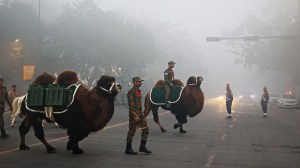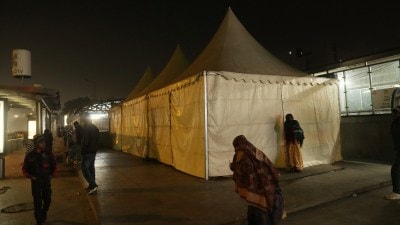Stay updated with the latest - Click here to follow us on Instagram
Wandering care-givers
A team of psychiatrists from the IHBAS provides free counselling sessions for the mentally ill in the city who have been abandoned by their families.
Aaj kaun sa din hai?
Monday
Time kitna hua?
7.30 pm
Aaj aap kahan jate ho?
Doctor saab ke paas,park mein
This conversation plays out every Monday,between an epilepsy patient abandoned by her family,and Bano ji,a community health worker,who recruits patients,for a weekly clinic.
Such camps are set up in homeless clusters across the city by a team of volunteering psychiatrists. The Urdu Park outside Jama Masjid hosts these camps often to help the scores of mentally ill who have been abandoned by their families,or never had homes to begin with.
A team of doctors from the Institute of Human Behaviour and Allied Sciences (IHBAS) has been visiting these colonies for the last three years,after attending to their regular hospital patients.
Bano ji s designation is that of a care manager. A 58-year-old who never went to school,she dedicates her time to finding ways to help remind the epilepsy patient of her bi-weekly consultations. I used to assist my husband in his work as a tailor. This is similar he stitches pieces of cloth together,and in the same way,I attempt to stitch battered lives, Bano ji says,a toothless smile lighting up her face.
The epilepsy patients family turned her out,fearing their children would also get affected by her fits. Since then,she has been drifting between night shelters. Doctors have failed to convince the family to take her back. A night shelter in Nizamuddin area also reportedly turned her out,when she wet herself one night,during one of her seizures.
Tracking and treating patients is only the tip of the iceberg. Our real challenges lie in the problems that the homeless face,in their daily lives. Often it just boils down to basic sensitisation,like in this case,officials thought she wet herself out of carelessness, Dr Rupali Shivalkar,associate professor of Psychiatry at IHBAS says.
While different junior doctors accompany the team every week,Dr Shivalkar attends every clinic date. The team comprises one psychiatric social worker,a clinical psychologist and the care givers.
The idea of starting such a camp,with coordinated efforts between legal and medical teams,germinated 11 years ago. I had returned from a years training at Johns Hopkins Hospital. In the USA,there are elaborate mental health programmes to actively manage the homeless with mental disorders, says Dr Nimesh Desai,director of IHBAS.
The visit opened his eyes to a fundamental problem in India. We have all seen such people on the streets,but we only pity them. We cannot actively treat them,because there is legal cushion, Dr Desai says.
Now,a local area magistrate accompanies the IHBAS personnel,to provide legal sanction for treatment.
Since November 2008,these doctors have tracked down homeless patients diagnosed with severe mental disorders like schizophrenia,bipolar disorder,depression and addiction issues. The standard protocol involves setting up a screen two daris (rugs) held up by volunteers and doctors administering injectible drugs behind its cover.
Some patients,like the clinics first,a 50-year-old woman suffering from amnesia,need hospitalisation. We found her outside a cinema hall in Connaught Place. She was tearing her clothes,Dr Desai says.
When counseling and basic anti-anxiety drugs were not enough,doctors sought magisterial permission for admitting her to IHBAS. We finally diagnosed her with schizophrenia. She was admitted for about three months,and then discharged. But she continues to be on medication and comes for all clinic dates, he says.







